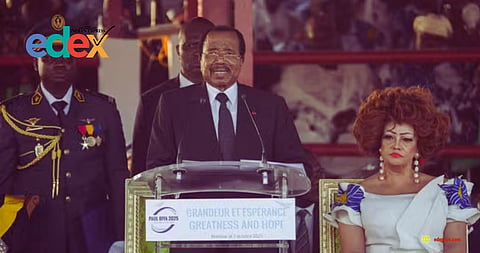

The Constitutional Council declared that Cameroon’s 92-year-old President Paul Biya won re-election with 53.66% of the votes, while his opponent, former ally Issa Tchiroma Bakary, received 35.19%. Voter turnout stood at 57.7%. The announcement came on Monday following the October 12 election, according to the Associated Press.
Clashes between protesters and security forces erupted in several cities, leaving at least four people dead. The four protesters were shot dead on Sunday in Douala, the economic capital, as hundreds of people stormed the streets in several cities.
Videos online showed clashes with security forces, who fired tear gas and tried to disperse people barricading roads in Douala and other cities, including Garoua and Maroua in the north.
Biya’s long rule and youth frustration
Biya has led the central African nation since 1982, ruling longer than most citizens have been alive. Over 70% of the population of almost 30 million is below 35. The Oct. 12 election has displayed growing tensions between Africa’s youth and its many ageing leaders.
Biya’s decision to seek another term angered youth and the opposition, which has accused him of having a hand in the disqualification of his strongest rival and using “state machinery” to manipulate the election. Tchiroma had claimed victory days ago, citing results he said were collated by his party. Biya’s party members dismissed the claim.
“I am ready to stake my life to defend my vote. I voted for Tchiroma because I want change,” said one protester, Oumarou Bouba, a 27-year-old trader in Maroua.
Following the announcement of election results, Sani Aladji, a 28-year-old hotel worker in Maroua, said, “Nothing will change. I expected that Issa Tchiroma would bring change, which is why I voted for him. There’s rampant corruption under Biya’s regime. We are tired of that.”
Governance challenges
Biya first came to power in 1982 following the resignation of Cameroon’s first president and has ruled since then, later benefitting from a constitutional amendment that abolished term limits. His health has been a topic of speculation as he spends most of his time in Europe, leaving governance to key party officials and family members.
While Cameroon is an oil-producing country with modest economic growth, young people say the benefits have not trickled down beyond the elites. According to World Bank data, the unemployment rate stands at 3.5%, but 57% of the labour force aged 18 to 35 works in informal employment.
Critics also accuse Biya of leading Cameroon from a period of relative stability into one of conflict. The country in recent years has faced attacks by Boko Haram militants in the north and a secessionist insurgency in the English-speaking North West and South West regions.
That crisis, triggered by government attempts to impose French in schools and courts, has killed nearly 7,000 people, displaced more than one million and sent thousands fleeing to neighbouring Nigeria.
